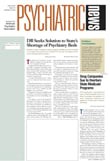The article “Report Decries College Students’ Culture of High-Risk Drinking” in the May 3 issue points to important issues that need to be addressed. However, I am disappointed that there was no mention of a vital issue—the need for sleep. Sleep deprivation and fatigue play a major role in drinking-related deaths and injuries. Communities, college administrators, and students should be educated on the effects of sleep deprivation and fatigue, in addition to the issue of excessive drinking in the college population.
As an old Irish proverb states, “The beginning of health is sleep.” Sleep experts define healthy sleep as the quantity and quality of sleep required for maintaining optimal alertness during waking hours. Sleep is biologically imperative, though Americans try to get by with less and less. This practice, however, has potentially severe consequences. The effects of sleepiness and fatigue are impaired reaction time, judgment, vision, information processing, logical reasoning, verbal ability, short-term memory, and lowered decision-making ability. Alcohol and lack of sleep have similar negative effects on human performance.
The U.S. National Highway Traffic Safety Administration conservatively estimates that approximately 100,000 police-reported crashes, 71,000 injuries, and 1,500 fatalities annually involve drowsiness and fatigue as factors. Many studies show that young adults are chronically sleep deprived and represent the majority of drowsy-driving crashes.
These statistics are without alcohol consumption being a factor. Alcohol exacerbates the effects of sleep deprivation. Alcohol consumption—in any amount—increases danger and risk. When sleep deprived, that is, on only four hours of sleep, one beer can have the impact of a six pack when not sleep deprived.
Society appears to be insufficiently concerned about the harmful impact of sleepiness, or “fatigue” as it is often referred to, even though fatigue contributed to almost all recent high-profile accidents. Catastrophes that have been attributed to fatigue include the Exxon Valdez, Chernobyl, Three Mile Island, Bhopal, and Challenger space-shuttle accidents. It has been estimated that approximately 90 percent of all industrial accidents can be attributed to fatigue and sleepines. Direct and indirect costs of sleep-related problems are estimated to be between $100 billion and $300 billion annually, according to the National Commission on Sleep Disorder Research. Due to great human and economic costs involved, sleep deprivation urgently needs to be addressed.
We are hopeful that in the near future the National Institute on Alcohol Abuse and Alcoholism’s task force on college drinking and sleep public awareness campaigns, such as that of the National Sleep Foundation, join forces to educate college students about the consequences of sleep deprivation and the importance of obtaining regular adequate and healthy sleep.
